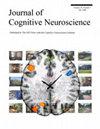在学龄前儿童选择性词汇学习过程中,说话者的能力会影响前额叶 Theta 和枕叶 Alpha 功率。
IF 3.1
3区 医学
Q2 NEUROSCIENCES
引用次数: 0
摘要
在本研究中,我们调查了学龄前儿童选择性单词学习的认知过程。我们测量了 67 名四岁儿童的θ(4-8 Hz)和α频率范围(7-12 Hz)的节律神经活动。我们记录了儿童在期待和编码新标签事件时的脑电图,该标签事件是由一名先前在给熟悉物体贴标签时表现出有能力(正确)或无能力(不正确)的说话者完成的。两组儿童在回忆时选择目标物体的频率相同。然而,观察不称职的演讲者的儿童对新词的表征较弱,这表现在他们在回忆时选择熟悉但不正确的项目的可能性增加。θ和α功率的调节表明,根据说话者能力的不同,对新标签-对象对的处理也不同。在无能力(而非有能力)说话者的条件下,预测和编码期间前额叶θ功率的增加与回忆成功率的增加有关。研究结果表明,本研究中的θ功率反映了认知控制。在这两种条件下,枕叶α功率--表明注意过程--反映了对新项目的熟悉程度,但方向相反。在熟悉的项目试验中,观察不称职的发言者时,α功率会增加,而观察称职的发言者时,α功率会降低。因此,单词学习过程中的认知控制和注意过程都会受到说话者特征的不同影响。本文章由计算机程序翻译,如有差异,请以英文原文为准。
Speaker Competence Affects Prefrontal Theta and Occipital Alpha Power during Selective Word Learning in Preschoolers
In the present study, we investigated the cognitive processes underlying selective word learning in preschoolers. We measured rhythmic neural activity in the theta (4–8 Hz) and alpha frequency range (7–12 Hz) in 67 four-year-olds. EEG was recorded during anticipation and encoding of novel labeling events performed by a speaker who had previously shown either competence (correct) or incompetence (incorrect) in labeling familiar objects. In both groups, children selected the target object equally often upon recall. However, children observing the incompetent speaker revealed weaker representations of novel words indicated by an increased likelihood for selecting familiar but incorrect items upon recall. Modulations in theta and alpha power suggest differential processing of novel label–object pairs depending on the speakers' competence. In the incompetent, but not the competent, speaker condition, increases in prefrontal theta power during anticipation and encoding were related to increased recall success. Findings suggest that theta power in the present study reflects cognitive control. In both conditions, occipital alpha power—indicating attentional processes—reflected familiarity with novel items, but in opposite directions. In familiar item trials, alpha power was increased observing the incompetent and decreased observing the competent speaker. Thus, both cognitive control and attention processes during word learning are differentially affected by speaker characteristics.
求助全文
通过发布文献求助,成功后即可免费获取论文全文。
去求助
来源期刊
CiteScore
5.30
自引率
3.10%
发文量
151
审稿时长
3-8 weeks
期刊介绍:
Journal of Cognitive Neuroscience investigates brain–behavior interaction and promotes lively interchange among the mind sciences.

 求助内容:
求助内容: 应助结果提醒方式:
应助结果提醒方式:


